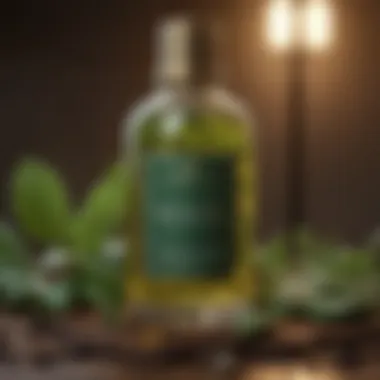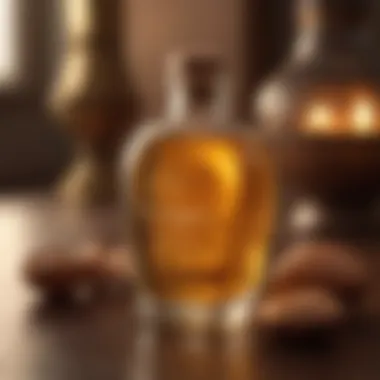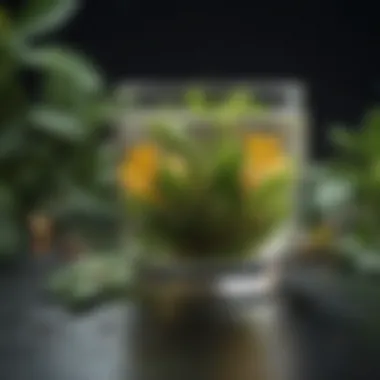Discover the Ultimate Solutions for Dry and Damaged Hair


Fashion Trends
Dry and damaged hair can be a significant concern for many individuals, impacting their overall look and confidence. Understanding the best solutions for addressing this issue is crucial in restoring hair health and vitality. From exploring natural remedies deeply rooted in traditional practices to delving into the effectiveness of modern professional treatments, there are various approaches to consider. This section will navigate through the latest trends in hair care, uncovering the most effective methods for rejuvenating dry and damaged hair.
Professional Treatments
Professional hair treatments have gained popularity for their targeted approach in combating dry and damaged hair. Techniques such as deep conditioning, keratin treatments, and scalp massages are known to provide nourishment and strength to weakened hair strands. Many salons offer specialized treatments tailored to individual hair needs, ensuring a personalized and effective solution for damaged hair. Understanding the benefits and considerations of professional treatments is essential in making informed decisions for hair restoration.
Deep Conditioning
Deep conditioning treatments penetrate the hair shaft, restoring moisture and improving elasticity. These treatments often contain essential oils, proteins, and vitamins that nourish and hydrate damaged hair. Regular deep conditioning sessions can help in repairing hair cuticles and preventing further damage, promoting overall hair health and luster.
Keratin Treatments
Keratin treatments involve the application of a protein-based solution to the hair, smoothing out frizz and strengthening the hair strands. This procedure helps in repairing damage caused by heat styling, chemical treatments, and environmental factors. By improving hair texture and manageability, keratin treatments are favored for their long-lasting results in revitalizing dry and damaged hair.
Natural Remedies
In seeking natural alternatives for hair care, various remedies have been traditionally used to address dry and damaged hair. Ingredients such as coconut oil, aloe vera, and honey are known for their moisturizing and repairing properties, promoting hair strength and resilience. The effectiveness of natural remedies lies in their ability to work in harmony with the hair's natural structure, avoiding harsh chemicals and additives that may further damage the hair. Exploring the benefits of natural remedies can provide valuable insights for individuals looking to nurture their hair with organic solutions.
Coconut Oil
Coconut oil has been revered for its deep conditioning properties, effectively penetrating the hair shaft and replenishing lost moisture. Rich in fatty acids and vitamins, coconut oil strengthens hair from within, reducing breakage and promoting healthy growth. Regular application of coconut oil can improve the texture and shine of dry and damaged hair, making it a popular choice in holistic hair care.
Aloe Vera
Aloe vera is celebrated for its soothing and hydrating effects on the hair and scalp. Its gel-like consistency contains enzymes and amino acids that repair damaged cells and promote hair growth. Aloe vera also helps in balancing the scalp's p H level, reducing dandruff and inflammation. Incorporating aloe vera into hair care routines can revitalize dry hair, leaving it soft, nourished, and resilient.
The quest for healthy and nourished hair extends beyond mere aesthetics, encompassing the ability to care for and restore the natural beauty of one's hair. By exploring the diverse array of treatments and remedies available, individuals can embark on a journey towards revitalizing dry and damaged hair, fostering hair that exudes health, vibrancy, and resilience.
Understanding Dry Damaged Hair
When it comes to the intricate world of hair care, understanding the nuances of dry and damaged hair holds critical importance. In this comprehensive guide tailored for individuals seeking to elevate their hair health, delving into the roots of dry and damaged hair is essential. By unraveling the causes, characteristics, and solutions specific to this issue, readers can equip themselves with invaluable knowledge to tackle their hair concerns head-on.


Causes of Dry Damaged Hair
-### Overuse of Heat Styling Tools The relentless pursuit of perfect hairstyles often leads us to overindulge in heat styling tools, inadvertently subjecting our hair to excessive heat and damage. The allure of straighteners, curling irons, and blow dryers can prove detrimental to the health of our hair, resulting in dryness and breakage. While these tools offer immediate styling gratification, their prolonged usage without protective measures can lead to long-term damage.
-### Chemical Damage from Hair Treatments Hair treatments, ranging from coloring to perming, frequently involve the use of potent chemicals that alter the hair's natural structure. These chemical processes, while transforming our hair into desired hues and textures, can strip it of essential moisture and nutrients, leaving it dry and fragile. Understanding the repercussions of chemical treatments is pivotal in mitigating their damaging effects and preserving hair vitality.
-### Environmental Factors The environment we dwell in exerts a significant influence on the health of our hair. Factors such as exposure to UV radiation, pollution, and harsh weather conditions can deteriorate the hair's overall condition, contributing to dryness and brittleness. Shielding our hair from these external aggressors through protective measures is vital in maintaining its strength and luster.
Characteristics of Dry Damaged Hair
-### Brittle and Prone to Breakage Dry and damaged hair manifests through its brittle texture and heightened susceptibility to breakage. The lack of moisture and nourishment renders the hair strands fragile, leading to frequent hair fall and reduced resilience. Tending to this fragility by incorporating hydration-rich products can aid in restoring the hair's strength and fortitude.
-### Lacks Moisture and Shine A distinctive trait of dry and damaged hair is its parched appearance devoid of natural shine and luster. The absence of adequate hydration renders the hair lackluster and dull, robbing it of its inherent beauty. Infusing moisture-rich treatments and oils into the hair care routine can replenish lost hydration, fostering a radiant and healthy sheen.
-### Split Ends and Frizz Split ends, characterized by the fraying of hair tips, and frizz, defined by unruly hair strands, are prevalent signs of hair damage. These visible indicators reflect the weakened state of the hair cuticles, necessitating targeted interventions to seal split ends and tame frizz. Embracing holistic hair care practices can address these concerns, resulting in smoother, healthier-looking hair strands.
Home Remedies for Dry Damaged Hair
Home remedies for dry damaged hair play a crucial role in the restoration and nourishment of your hair. These natural solutions provide a gentle yet effective way to address the effects of dryness and damage. By utilizing ingredients readily available at home, individuals can avoid harsh chemicals and embrace a more holistic approach to hair care. Home remedies offer a personalized touch to hair treatment, allowing for tailored solutions that cater to individual needs and preferences. Additionally, opting for home remedies can often be more cost-effective and sustainable in the long run, aligning with the growing trend towards natural beauty practices.
Natural Oils for Nourishment
Coconut Oil
Coconut oil stands out as a versatile and popular choice for addressing dry and damaged hair. Its unique composition allows it to penetrate the hair shaft, deeply moisturizing and nourishing from within. The high levels of fatty acids in coconut oil help in strengthening the hair structure and combating issues such as split ends and breakage. Moreover, coconut oil possesses natural antimicrobial properties that contribute to scalp health, promoting overall hair vitality. While coconut oil may be slightly heavier for some hair types, its benefits in conditioning and revitalizing damaged hair make it a preferred option for many seeking natural hair care solutions.
Argan Oil
Argan oil, also known as 'liquid gold,' is celebrated for its rich content of vitamins, antioxidants, and essential fatty acids. In the realm of hair care, argan oil shines as a lightweight yet potent source of hydration and nourishment. Its ability to smooth frizz, enhance shine, and improve overall hair texture makes it a valuable inclusion in hair care routines. Argan oil is particularly beneficial for those with dry, brittle hair, providing a protective barrier against environmental stressors and heat damage. As a highly absorbent oil, argan oil leaves hair feeling soft, silky, and rejuvenated.
Olive Oil
Olive oil has long been revered for its moisturizing and conditioning properties, making it a favored choice for treating dry and damaged hair. Rich in vitamins E and K, olive oil helps to repair and strengthen hair strands, restoring elasticity and shine. Its emollient nature facilitates detangling and smoothness, reducing the appearance of split ends and frizz. Olive oil's ability to hydrate without weighing the hair down makes it an ideal option for those seeking a natural remedy to rejuvenate their locks. Incorporating olive oil into hair care routines can promote hair health and resilience over time.
DIY Hair Masks for Repair


Avocado and Banana Mask
The avocado and banana mask offers a potent mixture of vitamins, minerals, and antioxidants that work together to revitalize dry, damaged hair. Avocado boasts high levels of monounsaturated fats, which deeply moisturize and strengthen the hair shaft. Bananas, on the other hand, are rich in potassium and natural oils, promoting elasticity and hydration. This mask combination provides a nourishing treatment that restores luster and vitality to lackluster locks. While the ingredients may need thorough mixing and application, the results are often worth the effort, leaving hair soft, manageable, and visibly healthier.
Honey and Yogurt Mask
Combining the moisturizing properties of honey with the probiotic benefits of yogurt, the honey and yogurt mask offers a dual-action approach to hair repair. Honey's humectant qualities help in locking in moisture and improving hair elasticity, while yogurt's proteins strengthen and fortify the hair structure. This mask is particularly beneficial for those dealing with dryness and dullness, as it imparts a renewed radiance and softness to the hair. Despite the slightly sticky consistency of honey, the ease of preparation and application make this mask a convenient option for individuals seeking a pampering yet effective home remedy.
Aloe Vera Gel Treatment
Aloe vera gel stands as a versatile and soothing choice for repairing dry damaged hair. Its hydrating properties allow for deep conditioning without weighing down the hair, making it suitable for a wide range of hair types. Aloe vera's enzymes help in repairing dead skin cells on the scalp, promoting hair growth and overall scalp health. Additionally, its cooling effect alleviates scalp irritation and inflammation, fostering a healthy environment for hair to thrive. While the gel may require precision in application to prevent dripping, the benefits of aloe vera on the hair and scalp make it a worthwhile addition to any hair care regimen.
Professional Treatments for Dry Damaged Hair
Professional treatments play a crucial role in restoring dry and damaged hair to its former health and vitality. These treatments offer specialized care that can repair and nourish hair effectively. By focusing on the unique needs of damaged hair, professional treatments provide comprehensive solutions for individuals seeking to improve the condition of their hair.
Salon Procedures for Restoration
Keratin Treatment:
A keratin treatment is a popular choice for addressing dry and damaged hair. This procedure involves applying a keratin-based solution to the hair, which helps in strengthening and smoothing the strands. The key characteristic of a keratin treatment lies in its ability to replenish lost keratin levels in the hair, resulting in enhanced strength and resilience. One of the main advantages of keratin treatments is their long-lasting results, with hair becoming more manageable and frizz-free. However, it's essential to note that some keratin treatments may contain formaldehyde, a chemical that can be harsh on the hair and scalp.
Deep Conditioning Treatment:
Deep conditioning treatments are essential for providing intensive moisture to dry and damaged hair. These treatments involve using rich conditioning masks or creams to deeply nourish and hydrate the hair. The primary characteristic of deep conditioning treatments is their ability to penetrate the hair shaft and repair damage from within. This makes them a beneficial choice for individuals looking to restore moisture and softness to their hair. While deep conditioning treatments offer immediate results, overuse can lead to product buildup, weighing down the hair.
Scalp Treatments:
Scalp treatments are designed to address specific scalp issues that may contribute to hair dryness and damage. These treatments can range from exfoliating scalp scrubs to moisturizing serums. The key characteristic of scalp treatments is their focus on scalp health, which is vital for promoting strong and healthy hair growth. Scalp treatments are a popular choice for individuals dealing with conditions like dandruff or dry scalp. However, it's essential to choose scalp treatments carefully, as some products may contain ingredients that can irritate the scalp.
Haircare Products for Recovery
Haircare products play a significant role in the recovery of dry and damaged hair. From moisturizing shampoos to nourishing hair serums, these products are essential for maintaining the health and vitality of the hair.
Moisturizing Shampoos and Conditioners:


Moisturizing shampoos and conditioners are formulated to provide hydration to dry and damaged hair. These products contain ingredients like oils and vitamins that help in restoring moisture and improving hair texture. The key characteristic of moisturizing shampoos and conditioners is their ability to cleanse the hair without stripping it of its natural oils. This makes them a popular choice for individuals looking to nourish their hair while cleansing it. However, it's essential to select products that match your hair type to achieve optimal results.
Leave-In Conditioners:
Leave-in conditioners are leave-in treatment products that offer continuous hydration and protection to the hair throughout the day. These products are lightweight and designed to be left in the hair without rinsing. The key characteristic of leave-in conditioners is their ability to detangle and soften the hair, making it more manageable. This makes them a popular choice for individuals seeking to combat dryness and frizz. While leave-in conditioners provide instant hydration, using them in excess can lead to product buildup, weighing down the hair.
Hair Serums and Oils:
Hair serums and oils are concentrated formulas that target specific hair concerns such as frizz, breakage, and dullness. These products contain nourishing ingredients like botanical oils and vitamins that help in improving hair health. The key characteristic of hair serums and oils is their lightweight texture, which allows for easy absorption into the hair. This makes them a beneficial choice for individuals looking to add shine and smoothness to their hair. However, it's important to use hair serums and oils in moderation, as using them excessively can make the hair greasy.
Lifestyle Changes for Healthier Hair
In the quest for revitalizing dry and damaged hair, embracing lifestyle changes holds paramount significance. Our hair's health is intricately connected to our lifestyle choices, making it imperative to focus on specific elements that can foster the desired improvements. By prioritizing the following factors regarding lifestyle changes for healthier hair, individuals can pave the way for enhanced hair vitality.
Nutrition for Hair Health
Eating Foods Rich in Omega-3s
Delving into the realm of nutrition for hair health, the emphasis on consuming foods rich in Omega-3 fatty acids emerges as a crucial aspect. The inclusion of Omega-3s in one's diet plays a pivotal role in nourishing the hair follicles, promoting growth, and enhancing overall hair quality. The distinctive characteristic of Omega-3-rich foods lies in their ability to strengthen hair strands and combat dryness, making them a preferred choice for individuals seeking to improve hair health. The unique feature of Omega-3s is their proven efficacy in fortifying hair structure and enhancing shine, which stands as a testament to their unrivaled advantages in promoting optimal hair health.
Staying Hydrated
Discussing the importance of staying hydrated in the context of hair health underscores its substantial contribution. Adequate hydration is fundamental for maintaining the moisture balance in both the scalp and hair strands, ensuring they remain supple and resilient. The key characteristic of staying hydrated lies in its ability to prevent hair from becoming dry and brittle, making it a popular choice for individuals aiming to retain optimal hair condition. The unique feature of hydration is its capacity to enhance hair elasticity and shine, highlighting its advantageous role in fortifying hair health.
Supplements for Hair Growth
Exploring the realm of supplements for hair growth unveils a realm of possibilities for enhancing overall hair health. Supplements enriched with vital nutrients like biotin, vitamins, and minerals can significantly boost hair growth and combat damage. The key characteristic of hair growth supplements is their targeted approach towards addressing specific hair concerns, making them a beneficial choice for individuals seeking to augment their hair's vitality. The unique feature of such supplements lies in their ability to stimulate hair follicles, increase hair thickness, and improve overall hair texture, underscoring their advantageous role in promoting robust hair growth.
Haircare Practices to Avoid Damage
Limiting Heat Styling
Delving into the practice of limiting heat styling in haircare routines sheds light on its pivotal role in minimizing damage and preserving hair health. Excessive heat exposure can strip hair of its natural moisture, leading to dryness, breakage, and dullness. The key characteristic of limiting heat styling lies in its ability to protect hair from heat-induced damage, making it a beneficial choice for individuals striving to maintain vibrant and healthy hair. The unique feature of avoiding excessive heat styling is its capacity to enhance the longevity of hair color and maintain optimal hair strength, highlighting its undeniable advantages in safeguarding hair integrity.
Protecting Hair from Sun Exposure
Exploring the significance of protecting hair from sun exposure underscores its profound impact on preserving hair health and vibrancy. Prolonged sun exposure can lead to moisture loss, color fading, and weakened hair strands. The key characteristic of hair sun protection lies in its ability to shield hair from harmful UV rays, making it a crucial choice for individuals prioritizing hair care. The unique feature of sun protection is its capacity to prevent premature aging of hair and maintain color vibrancy, accentuating its advantages in safeguarding hair vitality.
Avoiding Harsh Chemical Treatments
Discussing the practice of avoiding harsh chemical treatments highlights its pivotal role in preserving hair integrity and vibrancy. Chemical treatments like bleaching, perming, and excessive coloring can severely damage the hair cuticle, leading to brittleness and breakage. The key characteristic of avoiding harsh chemicals lies in its ability to maintain hair's natural strength and sheen, positioning it as a prudent choice for individuals valuing hair health. The unique feature of steering clear of harsh chemicals is its capacity to prevent long-term damage and promote sustained hair health, underscoring its advantages in nurturing healthy hair.



